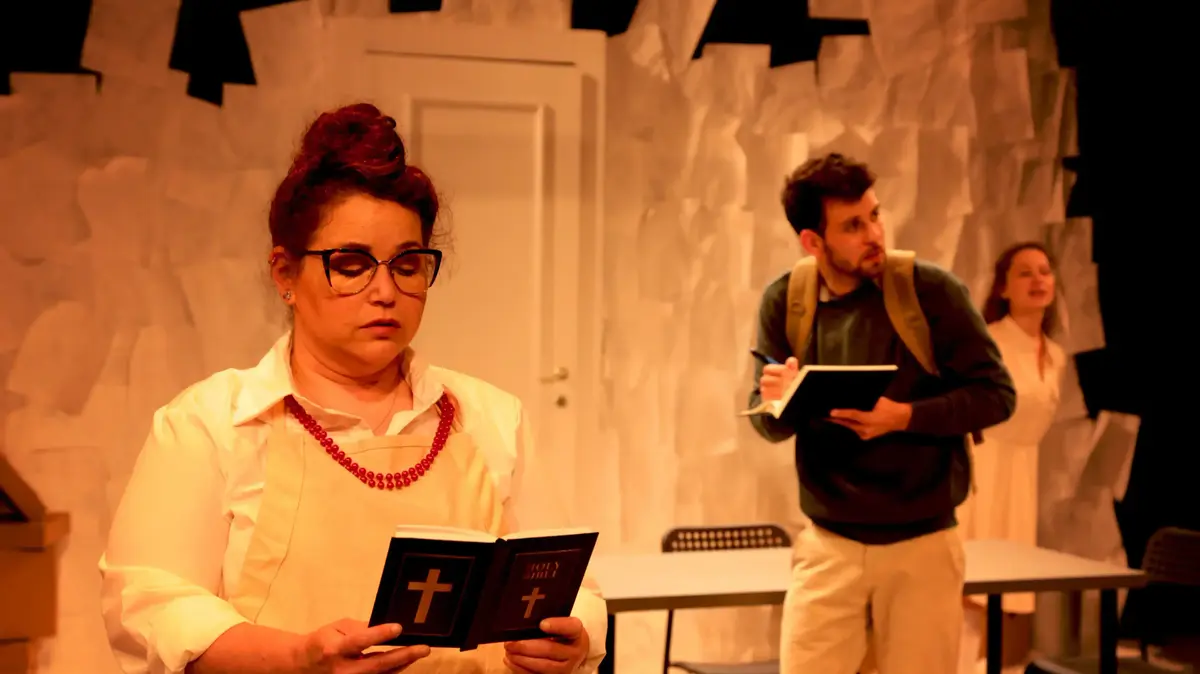Horrific murder, horror stories, songs and dances: "The Pillow Man" is both thought-provoking and distressing
Martin McDonagh's sophisticated black comedy describes shocking events in a violent and alienated world, and despite the mesmerizing text - it's hard to enjoy it.
The musical additions of the new arrangement on the stage are exciting - but there is too little of this material in such a long and demanding evening
Nadav Menuhin
11/08/2022
Thursday, August 11, 2022, 10:37 am Updated: 11:15 am
Share on Facebook
Share on WhatsApp
Share on Twitter
Share by email
Share in general
Comments
Comments
On the regime's fear of literature.
From "The Pillow Man" (Photo: Nimrod Landsman)
Katorian Katorian the narcissist works in a butcher shop, but in his own eyes he is a writer.
He writes short horror stories, many of which depict shocking cruelty to children, which may or may not be related to his personal biography.
But horrifyingly, in the dystopian dictatorship in which he lived, some took his words very literally, and inspired them to commit terrible crimes against three unfortunate children.
In a room full of boxes and papers, Katorian is interrogated in the case as a suspect alongside his intellectually challenged brother by two policemen, one of whom is particularly violent.
Within a day secrets will be revealed, truths will be revealed, and the mystery will be solved, more or less.
"Pillow Man" was created by Martin McDonagh, an acclaimed playwright and director who in recent years gained fame as the man behind the film "Three Signs Outside Ebbing, Missouri," which is also, in a way, a black comedy that deals with the arbitrariness of extreme violence.
Although this is a play that is less than 20 years old, it is already known to the local audience, and its production at Bhima is at least the third to be staged in Israel.
You can understand why it works a charm on theater groups all over the world: it is a tragico-comic text, bitter and dark but also ironic and sarcastic, and above all multi-layered: it has on the one hand a simple and interesting plot in itself, and on the other hand the ability to poetically discuss more abstract issues such as suffering , heritage, the permeation of violence from the state into private life, and the mutual relationship between literature and reality.
The numbers are great, it's a shame they are so few.
From "The Pillow Man" (Photo: Nimrod Landsman)
Still, why stage again a play that was staged in Israel only a few years ago?
The answer of the current production of the stage, directed by Yair Shapira, is a stylistic innovation, befitting the current era of the National Theater: if it's a black comedy about shocking murders, then why not add songs and dances to it as well.
There is no paradox here: think for example of the brilliant musical "Sweeney Todd", the book The Killer from Fleet Street, to think of one example of a musical that deals with similar issues.
"The Pillow Man" is not a musical in the conventional sense of the word, and it contains no more than three or four numbers, but they also serve well the ironic tone of the play, and also allow an alienation from the horror depicted on stage.
In fact, the opening number is so exciting that it radiates everything that is fun in young theater: daring, originality, defiance and fun.
But actually, one can only regret that in such a long evening - the show lasts about two and a half hours, including an intermission - there is too little of this excellent material, and that most of the staging is minimalistic and standard in a way that contrasts with the extreme plot happening.
More in Walla!
The musical "Rocky's Movie Show" is coming to Israel, and it is simply unlike anything else
To the full article
Five actors play all the roles in the play: Roni Mehravi and Omer Shimshoni as investigators of the crime series (Mehravi, it should be noted, only recently played a policewoman in the "Manaich" series);
Tomer ben Amram as the terrified Katorian whose walls are slowly closing in on him;
Ronnie Ackerman as a girl who falls victim to literary and real crimes;
In particular, Lior Avivi stands out as Michael, Katorian's brother, himself a victim of abuse and someone who has difficulty distinguishing between a story and reality - a distinction that the entire play challenges.
The character's story is depressing, but the dialogues between him and his brother create a lot of moments with great comedic timing.
The second act of the play, in which he stars, contains some of the best moments in the play.
"The Pillow Man" is, therefore, a demanding show, also in terms of length and especially in terms of content.
It corresponds with a host of violent stories that are at the heart of Western culture, from the crucifixion of Jesus to the Pied Piper of Hamlin.
At the heart of the plot is radical, motiveless violence directed at the helpless, especially children.
Some exist in the dark practicalities of Katorian, and some in reality.
The story after which the play is named suggests suicide to avoid unnecessary suffering.
When these are juxtaposed with police violence and other types of psychological abuse, and when the play seems to revel in descriptions of horror, it is hard not to feel deeply distressed as viewers.
It is difficult to enjoy such a show, for all the piot and irony that exist in it.
Some of the best moments in the show.
Lior Avivi and Tomer Ben Amram from "The Pillow Man" (Photo: Nimrod Landsman)
At the same time, there is also something mesmerizing in the text itself, which snorts in memory and thought, certainly with regard to the stories within the story, and the questions they themselves give rise to.
Did Katorian's childhood inevitably dictate the content of his stories?
Are the horror stories he wrote responsible for the atrocities that followed them?
Is he himself responsible for them?
His parents?
What is the law of art that encourages or normalizes violence?
But the play answers these questions wisely: literature only reflects the society in which it lives, and the government's fear of its ability to shape reality is tantamount to moral panic.
The dictatorial and dystopian regime in which "Pillow Man" takes place hates literature.
"We like to execute writers," Topolsky tells Ketorian.
It conveys a message.
She even threatens to burn all the stories he created.
Such a regime, in which investigators beat suspects and execute without trial, corrupts society and is far more responsible for violent norms than the writer's stories, which almost all remain in the drawer.
for such a reality,
culture
in what
theater
Tags
the stage
Martin McDonagh









